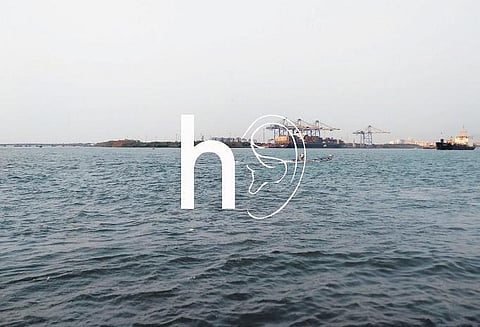

KOCHI: For Frenchman Vincent Chomaz and Armenian Edgar Kandratian, Kochi was an obvious choice for their project because of its geography, sandwiched between the sea and the backwaters, along with its history of the devastating floods of 2018. “The mythology surrounding the creation of Kochi – the great flood that destroyed Muziris – was also an interesting point but it was not until we reached Kochi that this detail gained importance,” say the artists.
Sixteen, one-minute soundcards, part of a series titled ‘Soundcards From a City at the Edge of the Sea’ are a sound map of Kochi and its backwaters. Through this archive of sequential audio cards, one is privy to the sounds of waves crashing, children playing and birds in their element – sounds that remind oneself of the city. The artists were in-residence at Pepper House, Fort Kochi, as part of the Goethe-Institut’s Bengaluru Residency Programme, before the lockdown.
Vincent and Edgar met each other in the courtyard of a project space in Berlin-Kreuzberg. A shared love for visual communication, conceptual arts and interdisciplinary approach to devise culture identities was the deciding factor for them to collaborate in 2014. They spent a month moving a white cube through the streets of Berlin, setting nine performances in the city’s public space, which cemented their friendship. In 2017, Vincent and Edgar decided to work on what they hear. ‘When The Sea Rises’, their second collaborative project, was a serendipitous result of a trip Edgar took in March 2019, during which he visited Kochi and the biennale.
Was the sight and knowledge of the city’s geographical origins the primary launchpad for the project?
The project took off after we read a scientific paper that re-evaluated how much land would be threatened to be lost to sea-level rise, annual flooding and tidal erosion. The scale of the prediction was shocking but in a way that was almost unfathomable. The publication of this first paper was concomitant with the publication of the call for projects for the Goethe-Institut Bangalore residency at Pepper House. We saw the call as an opportunity to answer this fundamental question: What will happen when the sea finally rises? To try to grasp the reality of it as these changes are so drastic that they almost feel inconceivable, a complete fiction.
We wanted to approach climate change through our bodies; to walk the shore that will arise in 50 or 100 years from now, and look for the sounds that would be altered, talk with the people who would be impacted and see how they were perceiving this cataclysmic future. We were interested in searching for what could be lost.
Why did you opt to present it in the form of soundcards?
The soundcards were a natural reaction to the difficulties– or rather restrictions – we experienced while in Kochi. They were a means for us to come back to the recordings we had produced during our residency at Pepper House – our field recordings, the interviews – and a way to share our process with other people. After the way the project had ended, with Vincent leaving Kochi on the day India closed its airspace and with I having to take a repatriation flight after a week or so, it was important to take this time to re-listen to our recordings and reconnect with the project. The project had also been very much impacted, by the virus and the soundcards allowed us to invite people into our working process of associative listening.
Could you explain about the kind of research undertaken for the project?
The project, ‘When the Sea Rises’, was the research. It was only intended as a potentially participative and collaborative research project. We were supposed to spend a month researching, walking around Kochi and the backwaters, speaking to people and listening. In a sense, this project was never completed. It was increasingly disrupted by how the situation evolved in Europe and India. But we are also now beyond it. And from this research, we are now working on a new sound piece which should, if all goes well, be presented as part of the biennale.The soundcards can be accessed on the Instagram handle @kochibiennale.